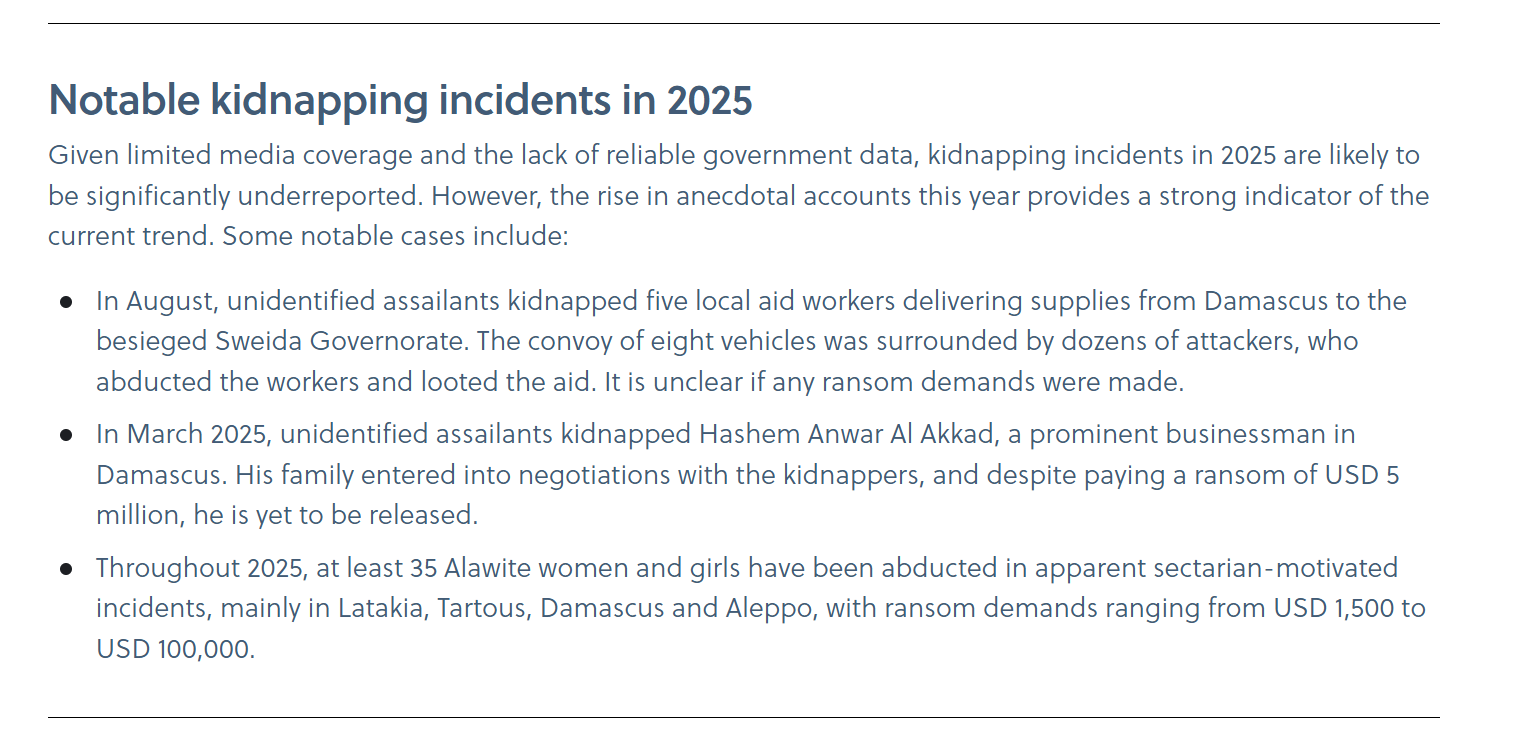Ransoms and revenues: Kidnapping and extortion dynamics in Syria
While extortion and kidnapping were persistent features of Syria’s 13-year civil war, incidents have increased in 2025, particularly in areas formerly controlled by Bashar Al Assad’s regime. Assad’s ousting in late 2024 has left a security vacuum that armed groups and criminal networks are seeking to exploit, even as the new transitional authorities work to establish control. At the same time, long-standing militant groups and organised crime networks elsewhere in Syria continue predatory activities amid the absence of state authority and the virtual collapse of the formal economy. The new government is attempting to reverse this by attracting foreign investment to rebuild infrastructure and stimulate growth, which is likely to bring an influx of foreign nationals and capital over the coming years. Yet with many of the dynamics driving both the recent rise in illicit activities and long-standing security challenges unlikely to be addressed in the near term, these trends pose a clear concern for potential investors.
No Assad, no problem?
As the new transitional authorities, led by President Ahmad Al Sharaa, sought to establish their own institutions, one of their first moves was to dismiss the previous regime’s police and security officials. While Assad’s security apparatus had been a tool of oppression, the decision has since drawn growing domestic criticism. Efforts to recruit replacements have fallen short, with the interior ministry acknowledging a need for 50,000 officers to fully staff the force. This shortfall has created major capability gaps in areas once controlled by Assad’s security forces in western and central Syria, allowing a variety of armed actors – including newly-formed militias, former opposition factions integrated unevenly into government structures, and opportunistic criminal groups – to further entrench themselves in cities such as Damascus, Homs, Tartous, and Latakia. Many of these areas are increasingly contested and unstable, enabling these groups to carry out crimes such as kidnapping for ransom and systematic extortion of local residents and businesses with relative impunity.
Yet with many of the dynamics driving both the recent rise in illicit activities and long-standing security challenges unlikely to be addressed in the near term, these trends pose a clear concern for potential investors.

Old habits die hard
Compounding matters, armed groups with a long history of predatory behaviour elsewhere in Syria have little incentive to change course as the new authorities struggle to project control across the country. In Aleppo Governorate, Turkish-backed Syrian National Army (SNA) factions – some now nominally operating under the Ministry of Defence – have intensified extortion activities, with locals reporting regular “fines” of up to USD 5,000 and farmers paying “taxes” amounting to 30 percent of their harvest. Similar dynamics persist in eastern Deir Al Zor, where although the Islamic State (IS) no longer controls territory, it continues to extort oil operators and destroy property when payments are withheld. In Sweida, comparable trends are evident, with criminal and trafficking networks entrenched in the south’s volatile environment and likely responsible for the recent aid worker abductions.

Rocky road ahead
Syria’s transitional government is making visible efforts to attract investment and establish governance by incorporating existing, often informal, local structures and security groups into the broader state apparatus. Yet the legacy of 13 years of conflict looms large: the entrenched power of militant and criminal actors, combined with the challenges facing the new authorities and the country’s severe economic crisis, continues to create conditions favourable for illicit activity, including kidnapping and extortion. While most victims of these crimes are currently locals and local businesses, the perceived higher value of foreign nationals means they could increasingly be targeted as flows of foreign capital and personnel grow.
